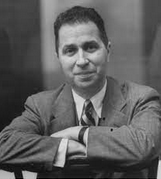From the 1930s on, Robert Maynard Hutchins of the University of Chicago and Mortimer J. Adler, the “Great Books” philosopher, expressed great concern about the state of American education. As they saw it, what passed for education had degenerated into vocational training for jobs that either didn’t exist or were completely different than those for which people had been trained.
 |
| Robert M. Hutchins |
Both Hutchins and Adler saw the problem as what people wanted from the universities and even grade schools, and thus what they were getting. Their contention — and the reason they promoted the “Great Books” program — was that the surrounding culture was having a detrimental effect on education, family life, and religion.
Hutchins thought
that if the income problem could be solved people would return to a more
rational way of life and there would be a revival of education, as well as
marriage and family and religion. Adler
was more specific. He collaborated with
ESOP inventor Louis Kelso in the late 1950s and early 1960s and presented a way
people could become personally empowered through capital ownership achieved
without redistribution or inflationary government spending.
 |
| Louis O. Kelso |
Key to Kelso’s idea is a fundamental reform of monetary and tax systems that would enable ordinary people to purchase capital on credit, pay for the capital out of the future earnings of the capital itself, and thereafter have a stream of consumption income. This would break their dependence on government or a private sector employer.
Kelso’s ideas were described in the two books he co-authored with Adler, beginning with The Capitalist Manifesto in 1958. The book presents the moral and economic case for expanded capital ownership as a fundamental human right. Rather than rely on coercive redistribution or charity, however, Kelso’s idea was to allow ordinary people to purchase newly issued shares in sound companies on credit and pay for the shares with dividends paid on the shares.
Freed from the necessity of working to gain subsistence, people would be empowered to do the work of civilization, what Aristotle called “leisure work,” such as growing in personal virtue — or teaching, learning, researching, or administering at a university.
 |
| Mortimer J. Adler |
Adler co-authored a second book with Kelso describing how the financing would work in greater detail, The New Capitalists (1961), with the provocative subtitle, “A Proposal to Free Economic Growth from the Slavery of Savings.” He did not, however, apply the program to the problem of freeing Academia from dependency on outside sources of funding. His later discussions on the importance of a personalist economic and political democracy based on widespread ownership of capital omitted any mention of the possibility of using Kelso’s ideas as a key element in reforming American education.
At the heart of what Kelso eventually called “binary economics” is the realization that capital and labor are both productive, and they are both productive (i.e., produce goods and services) in the same way. Defining labor as all human inputs to production, and capital (including land) as all non-human inputs, Kelso recognized labor and capital as two interdependent yet distinct factors of production.
 |
| Louis O. Kelso |
Considered as a breakthrough in applying moral philosophy (which is what interested Adler) Kelso explained how modern finance could be used to provide money and credit to make every person a capital owner without redistribution. Expansion of commercial bank credit backed up by a central bank and collateralized with capital credit insurance could be used to provide full access to capital ownership by every member of society.
Inherent in binary economics, and thus economic personalism, are the three principles of economic justice. As modified from Kelso and Adler’s presentation in The Capitalist Manifesto, these are:
· Participative Justice, or the input principle, “from each according to his productive contributions through his labor and capital,”
· Distributive Justice, or the out-take principle, “to each according to his labor and capital contributions,” and
· Social Justice, or the feedback and corrective principle that repairs the institutional environment whenever anyone is denied equal opportunity to contribute to production through his labor and/or capital, or from receiving his just due according to his contributions.
Principles, of course, are only meaningless noises until they are applied to achieve specific goals. In economic personalism, these goals are expressed as the four pillars of a just market economy:
 |
| Mortimer J. Adler |
· A limited economic role for the State,
· Free and open markets within a strict juridical order as the best means of determining just wages, just prices, and just profits,
· Restoration of the rights of private property, especially in corporate equity and other forms of business organization, and
· Widespread direct ownership of capital.
There will likely be intense resistance to the idea of reforming Academia compounded by opposition to any innovation in funding education. Most of this will come from those who have benefitted most from the current system or who are able to control it through funding.
The need for such economic reform to support a moral reform was the same point made by Pope Leo XIII (cited by Adler) and Pope Pius XI. It is the only effective counter to the so-called “Great Reset” proposed by Klaus Schwab and the World Economic Forum that would take God completely out of society and impose a condition of dependency on most people.
A proposal to counter this in a proven way consistent with Catholic social teaching can be found in The Greater Reset: Reclaiming Human Sovereignty Under Natural Law from TAN Books.
#30#